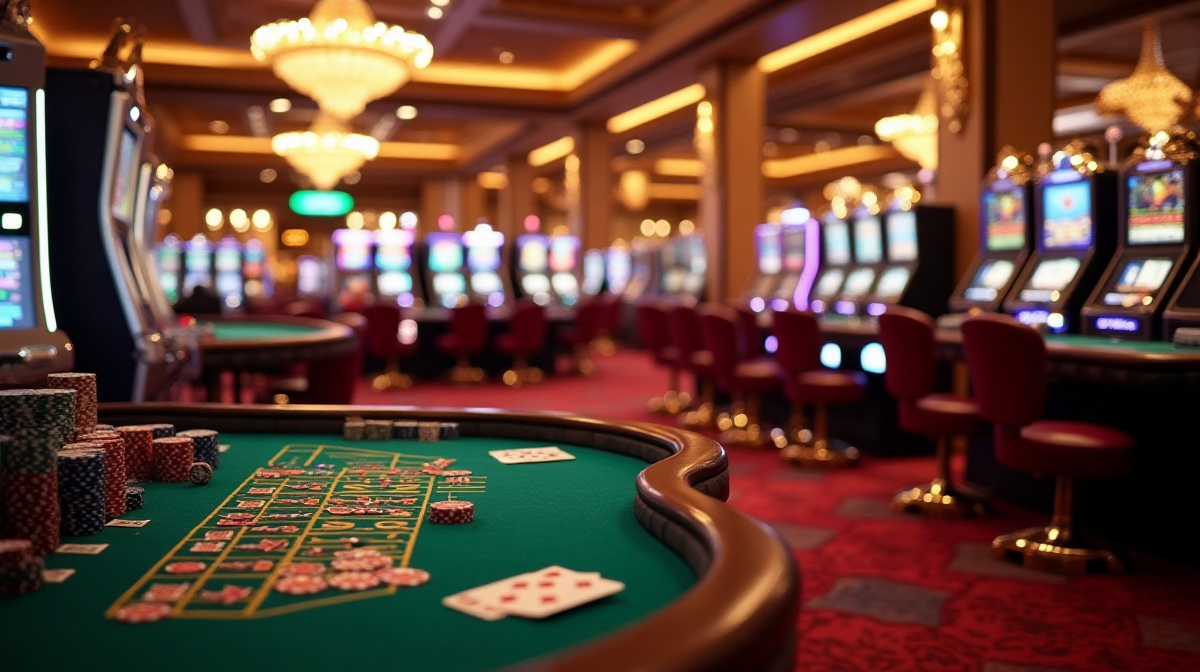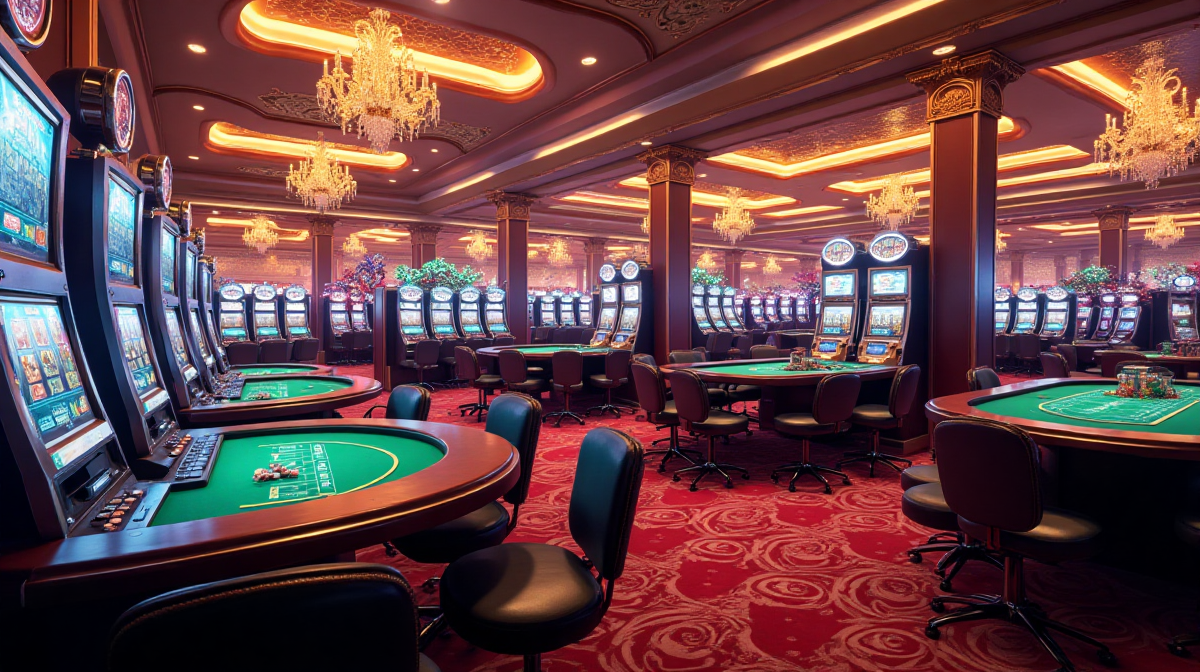Chess vs. Casino: Which Game is For You?
The Allure of Games: A Universal Human Drive
Humans have always been drawn to games. From ancient civilizations to the modern era, games provide entertainment, challenge, and a sense of accomplishment. They tap into our innate competitive spirit and offer a structured environment for testing our skills and taking risks. The appeal is universal, but the type of game that resonates with each individual varies greatly.
Briefly Introduce Chess & Casino Games – Contrasting Worlds
At opposite ends of the gaming spectrum lie chess and casino games. Chess, a centuries-old strategy game, is renowned for its intellectual depth and reliance on skill. Casino games, on the other hand, are largely governed by chance, offering quick thrills and the potential for financial gain (or loss). While seemingly disparate, both offer compelling experiences – but which one is right for you?
Setting the Stage: What We'll Cover – Skill vs. Chance
This article will delve into the core differences between chess and casino games, exploring the skills required, the level of control players have, and the overall experience each offers. We’ll examine the psychological factors at play and ultimately help you determine which world best aligns with your preferences and goals. We will even touch upon platforms like vivaro casino and the many vivaro casino slots available.
Understanding Chess: The Game of Skill
A Brief History of Chess – Origins & Evolution
Chess’s origins can be traced back to the 6th-century Indian game of chaturanga. Over centuries, it evolved through Persia and into Europe, undergoing significant rule changes and becoming the game we know today. Its rich history contributes to its enduring appeal.
The Core Mechanics of Chess – Pieces, Movement, & Objectives
Chess is played on an 8x8 checkered board with 32 pieces: 16 per player. Each piece – pawn, knight, bishop, rook, queen, and king – possesses unique movement capabilities. The objective is to checkmate the opponent's king, placing it under immediate attack (in “check”) from which it cannot escape.
The Cognitive Benefits of Playing Chess
Chess isn’t just a game; it's a mental workout.
Strategic Thinking & Planning
Chess compels players to think several moves ahead, anticipating their opponent’s responses and formulating long-term strategies.
Problem Solving & Analytical Skills
Each position on the board presents a unique puzzle. Players must analyze the situation, identify potential threats and opportunities, and calculate the optimal course of action.
Memory & Pattern Recognition
Recognizing common tactical motifs and remembering opening principles are crucial for success. Repeated play strengthens these cognitive abilities.
The Learning Curve & Commitment Required
Chess has a steep learning curve. Mastering the basics takes time and effort, and achieving true proficiency requires years of dedicated study and practice.
Chess as a Competitive Landscape – Tournaments & Ratings
Chess is a thriving competitive scene, with tournaments held at all levels, from local clubs to international championships. The Elo rating system provides a standardized measure of a player’s skill.
Exploring Casino Games: The Realm of Chance
A Spectrum of Casino Games – From Slots to Table Games
Casino games encompass a wide variety of options, from the simple allure of slot machines to the complex strategies of table games like poker and blackjack. Many platforms, such as vivaro casino, offer a huge range to choose from.
Popular Casino Games Breakdown
Slots: Simplicity and Randomness
Slots are undeniably the most popular casino game. Their appeal lies in their simplicity and the instant gratification they offer. Pulling the lever (or clicking the button) and hoping for a winning combination is a purely chance-based experience. Vivaro casino slots are particularly well-regarded for their variety and quality.
Poker: Skill with a Chance Element
Poker is unique in that it blends skill and chance. While luck plays a role in the cards you are dealt, strategic thinking, bluffing, and reading opponents are essential for long-term success.
Blackjack: Strategy vs. House Edge
Blackjack allows players to make strategic decisions that can influence their odds of winning. However, the house always retains an edge, ensuring profitability in the long run.
Roulette: Pure Chance & Odds
Roulette is a game of pure chance. Players bet on where a ball will land on a spinning wheel. The odds are fixed, and there’s no skill involved.
The Psychological Appeal of Casino Games
The Thrill of Risk & Reward
Casino games offer the thrill of risking money for the chance to win more. This adrenaline rush is a key component of their appeal.
The Dopamine Rush & Gambling Addiction
The intermittent rewards inherent in gambling trigger the release of dopamine, a neurotransmitter associated with pleasure and reward. This can lead to addictive behaviors.
Understanding House Edge & Probability
Every casino game is designed with a house edge, which guarantees the casino a profit over the long term. Understanding probability and odds is crucial for responsible gambling.
Responsible Gambling: A Crucial Consideration
It’s essential to gamble responsibly and within your means. Set limits, avoid chasing losses, and seek help if you believe you may have a gambling problem.
Chess vs. Casino: A Side-by-Side Comparison
Skill Level Required
Chess: Extensive Study & Practice
Chess demands significant time and effort to master. It requires continuous learning and a commitment to improving your skills.
Casino: Minimal Skill Needed
Most casino games require minimal skill. The outcome is largely determined by chance.
Control & Agency
Chess: Complete Control Over Your Actions
In chess, you have complete control over your moves and the direction of the game.
Casino: Limited Control – Reliance on Chance
Casino games offer limited control. Your fate is largely determined by the roll of the dice, the spin of the wheel, or the cards you are dealt.
Long-Term Outcome & Predictability
Chess: Skill Determines Long-Term Success
In chess, consistent skill and strategic thinking will lead to long-term success.
Casino: House Edge Ensures Long-Term Profit for the Casino
The house edge ensures that the casino will always win in the long run.
Financial Investment & Risk
Chess: Typically Low Investment
Chess is a relatively inexpensive hobby.
Casino: Potential for Significant Financial Loss
Casino games carry the risk of significant financial loss. Even vivaro casino registration comes with the responsibility of managing your funds.
Mental Stimulation & Challenge
Chess: Deeply Engaging & Mentally Demanding
Chess is a deeply engaging and mentally stimulating game.
Casino: Variable – Some offer strategy, most are passive
Casino games offer varying levels of mental stimulation. Many are passive and rely on luck.
Who is Chess For?
The Analytical & Strategic Mind
Chess appeals to individuals who enjoy analyzing complex situations and developing long-term strategies.
Individuals Seeking Long-Term Improvement
Chess offers a continuous learning curve, providing endless opportunities for improvement.
Those Who Enjoy a Mental Challenge
Chess is a challenging game that tests your cognitive abilities.
Players Who Prefer Control & Predictability
Chess offers a high degree of control and predictability, based on skill and strategic planning.

Who is the Casino For?
Individuals Seeking Entertainment & Excitement
Casino games provide a quick and easy form of entertainment.
Those Who Enjoy Risk-Taking
Casino games appeal to those who enjoy the thrill of taking risks.
Players Comfortable with the Element of Chance
Casino games are ideal for those who are comfortable with the inherent uncertainty of chance.
Social Gamblers Who Enjoy the Casino Atmosphere
The casino environment can be a social and exciting experience.

The Blurring Lines: Poker as a Hybrid
Deconstructing Poker – Skill, Strategy, & Chance
Poker stands out as a unique hybrid, combining elements of skill, strategy, and chance.
The Importance of Reading Opponents & Bankroll Management
Successful poker players must be able to read their opponents, manage their bankroll effectively, and make calculated decisions.
Poker as a Gateway to Strategic Thinking
Poker can serve as a gateway to developing strategic thinking skills that can be applied to other areas of life.
Conclusion
Recap: Chess vs. Casino – Different Strokes for Different Folks
Chess and casino games cater to vastly different preferences. Chess is a game of skill, strategy, and mental challenge, while casino games offer entertainment, excitement, and the allure of chance. Whether you find yourself drawn to the intricacies of a chess game or the flashing lights of a vivaro casino, the choice is ultimately personal.
Considering Your Personal Preferences & Goals
Consider your personality, your goals, and what you seek from a game. Do you prefer to rely on your own abilities, or do you enjoy the thrill of taking risks?
Final Thoughts: Choose the Game That Best Suits You
Ultimately, the best game is the one that you enjoy the most. Choose the game that challenges you, entertains you, and aligns with your individual preferences.

